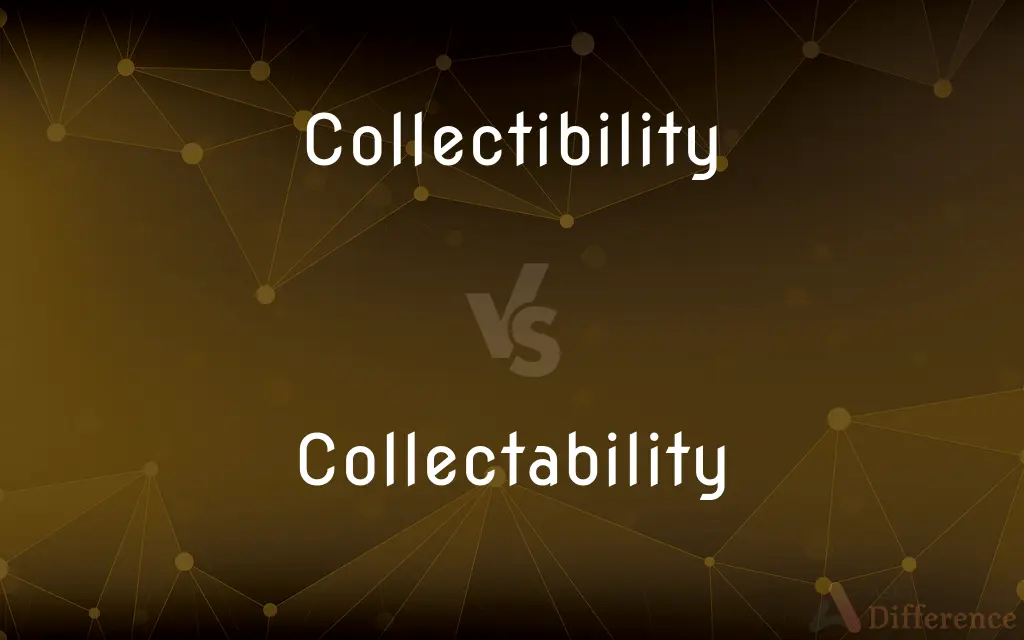Collectibility vs. Collectability — What's the Difference?
By Maham Liaqat & Fiza Rafique — Updated on May 8, 2024
Collectibility refers to the appeal and potential value of items for collection, while collectability indicates the general ability or suitability of items to be collected.

Difference Between Collectibility and Collectability
Table of Contents
ADVERTISEMENT
Key Differences
Collectibility often describes the inherent characteristics that make an item desirable to collectors, such as rarity or historical significance. Collectability, on the other hand, tends to focus more broadly on whether an item can be collected, regardless of its appeal or value.
Collectibility is typically used in contexts where the emphasis is on the item's market value or its uniqueness among collectors. Whereas collectability might refer to the practical aspects of collecting, like availability or legal restrictions.
Collectibility can affect an item's price on the collector's market, driven by demand and scarcity. Collectability, however, deals with the logistical or ethical feasibility of adding an item to a collection.
Collectibility can create a niche market for specific items among enthusiasts and collectors. Collectability ensures that an item is suitable for accumulation and preservation, emphasizing its longevity and storage needs.
Comparison Chart
Definition
Appeal and potential value of items for collectors
Suitability of items to be collected
ADVERTISEMENT
Usage Context
Market value, rarity, desirability
Availability, legality, practicality of collecting
Market Impact
Influences price and demand among collectors
Concerns the feasibility of collecting
Focus
On specific traits that attract collectors
On general traits that make collection possible
Collector Interest
High interest in unique, rare items
Interest in broadly available or suitable items
Compare with Definitions
Collectibility
The assessment of items based on their rarity and demand in the market.
Art collectibility varies greatly depending on the artist and the era.
Collectability
The potential for items to be legally and ethically collected.
The collectability of natural artifacts often involves regulations.
Collectibility
The attractiveness of items to enthusiasts and specialized collectors.
Stamp collectibility often hinges on historical significance and condition.
Collectability
The capability or suitability of an item to be added to a collection.
The collectability of modern art prints is due to their accessibility.
Collectibility
The quality of being worthy of collection due to unique attributes.
The collectibility of vintage cars is high due to their rarity.
Collectability
The broader appeal of items that can be easily stored and preserved.
The collectability of digital art is facilitated by technological advances.
Collectibility
The potential of an item to appreciate in value over time.
The collectibility of first edition books makes them excellent investments.
Collectability
The general attribute of items that makes them fit for accumulation.
The collectability of comic books is influenced by their condition and popularity.
Collectibility
The interest generated among collectors due to specific characteristics.
The collectibility of antique furniture is enhanced by provenance and craftsmanship.
Collectability
The trait of being able to be collected without specialized knowledge.
The collectability of contemporary novels does not require expert understanding.
Collectibility
The quality of being collectible.
Collectability
Alternative spelling of collectibility
Common Curiosities
What does collectability mean?
Collectability is the general ability or suitability of items to be collected.
What is collectibility?
Collectibility refers to the desirability and potential value of items among collectors.
Which term is more commonly used in the art world?
Collectibility is more commonly used in the art world to discuss the value and desirability of artworks.
Are there specific industries where collectability is more relevant?
Collectability is particularly relevant in industries like fossils or artifacts, where legal and ethical collecting practices are paramount.
What factors enhance an item's collectibility?
Factors like rarity, historical significance, and condition typically enhance an item's collectibility.
Is collectability concerned with the ethical aspects of collecting?
Yes, collectability considers the ethical and legal aspects of whether an item should be collected.
How does collectibility affect the value of an item?
Collectibility can significantly increase an item's value if it is rare or highly sought after by collectors.
Can an item have high collectability but low collectibility?
Yes, an item can be easy to collect due to availability but may lack the unique qualities that would make it highly valuable.
How do collectors assess collectibility?
Collectors assess collectibility by evaluating the rarity, market demand, and potential long-term value of items.
Does technological advancement affect collectability?
Yes, advancements in technology can enhance the collectability of items by making them more accessible or easier to preserve.
Share Your Discovery

Previous Comparison
Pliers vs. Tweezers
Next Comparison
Refinery vs. PetrochemicalAuthor Spotlight
Written by
Maham LiaqatCo-written by
Fiza RafiqueFiza Rafique is a skilled content writer at AskDifference.com, where she meticulously refines and enhances written pieces. Drawing from her vast editorial expertise, Fiza ensures clarity, accuracy, and precision in every article. Passionate about language, she continually seeks to elevate the quality of content for readers worldwide.
















































